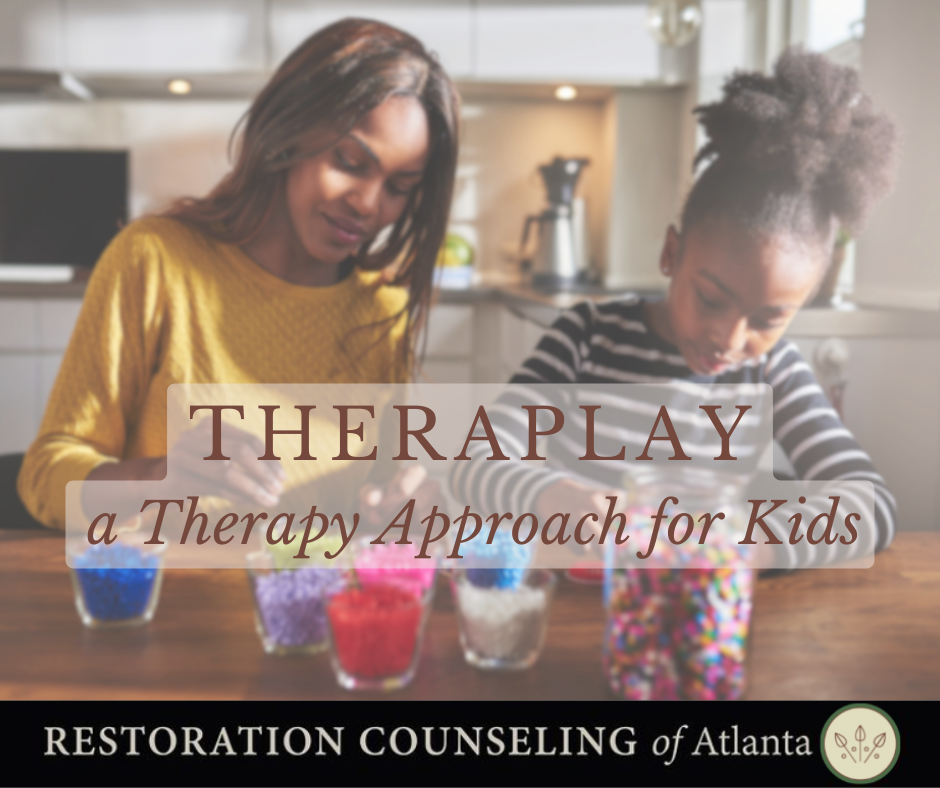Everyone needs support, but kids are special in that they are constantly exploring the world around them with open hearts and minds. Children are learning for the first time how to relate to, or in other words, how to attach to others. Attachment theory is a popular therapeutic model, and I enjoy using the attachment-based Theraplay model with families to help kids develop a positive attachment to their caregivers.
What is Attachment?
Attachment theory research has indicated that people thrive and trust others in the world when they establish a safe and secure relationship with at least one caregiver from a young age. The theory of attachment says our attachment styles are our basic blueprint for navigating safety and trust in relationships. When attachment is secure, we tend to experience more positive relationships in the world, believing we are worthy of positive relationships. On the other hand, when our attachment style is insecure, we tend to experience distress and anxiety in relationships, often unintentionally pushing others away, and not enjoying relationships in the way God made us to. These are brief descriptions of attachment theory, but if you’re interested in learning more about it and its impact, here are two articles for further understanding.
I’ve Learned My Attachment Style, So Now What?
Getting To Know The Four Attachment Styles
What is Theraplay?
Theraplay is an evidenced-based parent-child attachment theory play therapy. That’s a mouthful, so here’s a further explanation. Theraplay uses a clinician’s guidance to create a positive adult-child interaction. This ultimately aims at nurturing a securely attached and regulated child. This therapy builds upon attachment theory using developmentally appropriate games and activities. Understanding is bridged between caregiver and child, building a more secure attachment for the child. Engaging in a relationship with your child in this way creates love, joy, and connection between both caregivers and children. Ultimately, creating a secure attachment with your child communicates to the child that they are worthy of connection in the world. Ensuring a child learns this at a young age directly impacts their understanding of self and their ability to engage in relationships in adulthood. Research also indicates that securely attached individuals are better at emotional regulation and management.
Four Theraplay standards which guide the therapy experience:
- Nurture: the caregiver provides care that calms and soothes the child in both a physically and emotionally positive way.
- Engagement: the caregiver is present in a manner that helps the child feel seen, heard, felt, and accepted.
- Structure: the caregiver in the relationship provides predictability, safe boundaries, and organization, communicating safety to the child.
- Challenge: the caregiver supports the child in the acquisition and mastery of new skills, enhancing the child’s confidence and competence.*
Theraplay has proven helpful with a variety of presentations, from depression, anxiety, regulation issues, attention deficit, and hyperactivity disorder to early disruption and childhood trauma. Theraplay can be used with biological or foster families.
How do you know if Theraplay is right for your child/family? Click here to email me and schedule a free fifteen-minute consultation call!
References:
 Written by Samantha Mathews, MA, APC, NCC, CMHC
Written by Samantha Mathews, MA, APC, NCC, CMHC
Woodstock location
samantha@restorationcounselingatl.com
Samantha Matthews works with individuals of all ages. She wants to help create space and language for what you may be going through in life. Samantha sees individuals dealing with ADHD, anxiety, depression, gender issues, grief, postpartum depression, and trauma. She also does premarital and marital counseling.

